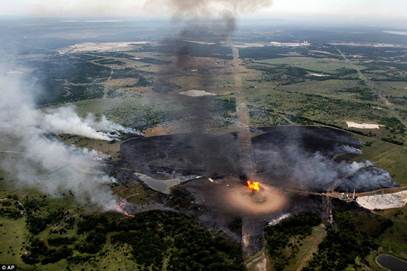When determining market value, appraisers must assume that the purchaser has “knowledge of all of the uses and purposes to which it is adapted and for which it is capable of being use.” The internet allows access to extensive information detailing natural gas pipeline explosions. A buyer acting with “knowledge” would be presumed to be aware of these issues. This impacts market value.
It is not difficult to locate information detailing incidents of natural gas pipelines exploding and killing people. When I tried a Google search of “natural gas pipeline explosions,” the first item consists of photographs like this.

Various Wikipedia page details lists of natural gas pipeline explosions. This page, listing incidents this century, compiles 26 incidents in the United States in 2014. This appears to be a typical annual number and the entry references 503 newspaper articles to document the incidents.
A second Wikipedia page provides the following summary of the deathtoll and property damage caused by pipeline accidents in the United States.
“1994 through 2013, the U.S. had 745 serious incidents with gas distribution, causing 278 fatalities and 1059 injuries, with $110,658,083 in property damage.
From 1994 through 2013, there were an additional 110 serious incidents with gas transmission, resulting in 41 fatalities, 195 injuries, and $448,900,333 in property damage.
From 1994 through 2013, there were an additional 941 serious incidents with gas all system type, resulting in 363 fatalities, 1392 injuries, and $823,970,000 in property damage.
A recent Wall Street Journal review found that there were 1,400 pipeline spills and accidents in the U.S. 2010-2013. According to the Journal review, four in every five pipeline accidents are discovered by local residents, not the companies that own the pipelines.”
The information age allows easy compilation of this data and access to it by people contemplating purchasing a property encumbered by a natural gas pipeline. Indeed, Michigan law assumes that a purchaser of property encumbered by a pipeline would, at a minimum, know this information. The Michigan Standard Jury Instructions summarize legal concepts in plain language that jurors can understand and apply. Real estate appraisers generally rely upon these instructions when preparing their reports. M Civ JI 90.06, defines Market Value to be “the highest price estimated in terms of money that the property will bring if exposed for sale in the open market with a reasonable time allowed to find a purchaser buying with knowledge of all of the uses and purposes to which it is adapted and for which it is capable of being used.” In 2015, when identifying the price that would be paid by a person is acting with the requisite knowledge, an appraiser should assume that the buyer would, at a minimum, engage in rudimentary internet searches about the potential dangers of pipeline explosions and review the type of information linked to this post.
Which then begs the question, would you pay the same price for two properties, identical in all other respects, if one included a natural gas pipeline with the apparent capability of exploding, sending fireballs into the sky and leaving massive craters and the other did not? The answer is obvious.
Please feel free to contact me if you have questions about a pipeline or any other proposed acquisition.